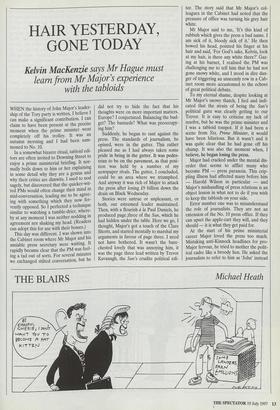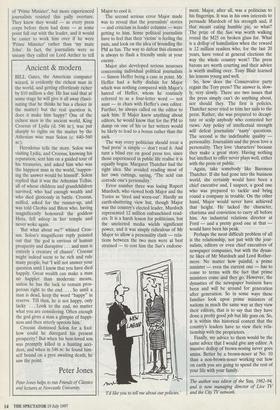HAIR YESTERDAY, GONE TODAY
Kelvin MacKenzie says Mr Hague must
learn from Mr Major's experience with the tabloids
WHEN the history of John Major's leader- ship of the Tory party is written, I believe I can make a significant contribution. I can claim to have been present at the precise moment when the prime minister went completely off his trolley. It was an autumn morning and I had been sum- moned to No. 10.
In a somewhat bizarre ritual, tabloid edi- tors are often invited to Downing Street to enjoy a prime ministerial briefing. It nor- mally boils down to him or her explaining in some detail why they are a genius and why their critics are dimwits. I used to nod sagely, but discovered that the quicker-wit- ted PMs would often change their mind in mid-conversation, leading me to be agree- ing with something which they now fer- vently opposed. So I perfected a technique similar to watching a tumble-drier, where- by at any moment I was neither nodding in agreement nor shaking my head. (Readers can adopt this for use with their bosses.)
This day was different. I was shown into the Cabinet room where Mr Major and his amiable press secretary were waiting. It rapidly became clear that the PM was feel- ing a tad out of sorts. For several minutes we exchanged stilted conversation, but he did not try to hide the fact that his thoughts were on more important matters. Europe? I conjectured. Balancing the bud- get? The bastards? What was preoccupy- ing him?
Suddenly, he began to rant against the press. The standards of journalism, he opined, were in the gutter. This rather pleased me as I had always taken some pride in being in the gutter. It was pedes- trian to be on the pavement, as that posi- tion was held by a number of my newspaper rivals. The gutter, I concluded, could be an area where we triumphed. And anyway it was rich of Major to attack the press after losing £9 billion down the drain on Black Wednesday.
Stories were untrue or unpleasant, or both, our esteemed leader maintained. Then, with a flourish a la Paul Daniels, he produced page _three of the Sun, which he had hidden under the table. Here we go, I thought, Major's got a touch of the Clare Shorts, and started mentally to marshal my arguments in favour of page three. I need not have bothered. It wasn't the bare- chested lovely that was annoying him, it was the page three lead written by Trevor Kavanagh, the Sun's erudite political edi-
tor. The story said that Mr Major's col- leagues in the Cabinet had noted that the pressure of office was turning his grey hair white.
Mr Major said to me, 'It's this kind of rubbish which gives the press a bad name. I am sick of it, bloody sick of it.' He then bowed his head, pointed his finger at his hair and said, 'For God's sake, Kelvin, look at my hair, is there any white there?' Gaz-
ing at his barnet, I realised the PM was challenging me to tell him that he had not
gone snowy white, and I stood in dire dan- ger of triggering an unseemly row in a Cab- inet room more accustomed to the echoes of great political debate.
To my eternal shame, despite looking at Mr Major's snowy thatch, I lied and indi- cated that the strain of being the Sun's political guru was clearly getting to our Trevor. It is easy to criticise my lack of
resolve, but he was the prime minister and
I was a tabloid tosspot. If it had been a scene from Yes, Prime Minister, it would
have been hilarious. But it wasn't and it was quite clear that he had gone off his chump. It was also the moment when, I believe, he began losing the press.
Major had cracked under the mental dis- order that seems to afflict many who become PM — press paranoia. This crip- pling illness had affected many before him — Harold Wilson in particular — and Major's mishandling of press relations is an object lesson in what not to do if you wish to keep the tabloids on your side.
Error number one was to misunderstand the role of journalists. They are not an extension of the No. 10 press office. If they can upset the apple-cart they will, and they should — it is what they get paid for.
At the start of his prime ministerial career Major loved the press too much. Mistaking anti-Kinnock headlines for pro- Major fervour, he tried to mother the polit- ical cadre like a broody hen. He asked the journalists to refer to him as 'John' instead of 'Prime Minister', but more experienced journalists resisted this pally overture. They knew they would — as every press corps before them had done — at some point fall out with the leader, and it would be easier to work him over if he were `Prime Minister' rather than 'my mate John'. In fact, the journalists were so uneasy they called on Lord Archer to tell Major to cool it.
The second serious error Major made was to reveal that the journalists' stories — and criticism in leader columns — were getting to him. Some political journalists have to feel that their 'victim' is feeling the pain, and look on the idea of hounding the PM as fun. The way to defeat this element is always to flash a friendly smile at your enemy.
Major also developed serious neuroses concerning individual political journalists — Simon Heifer being a case in point. Mr Heifer had a hefty disdain for Major which was nothing compared with Major's hatred of Heffer, whom he routinely referred to as a four-letter word — not aunt — in chats with Heifer's own editor. Further, he always called on the editor to sack him. If Major knew anything about editors, he would know that for the PM to dump on one of his or her writers would be likely to lead to a bonus rather than the sack.
The way every politician should treat a `bad press' is simple — don't read it. And turn a blind eye on good press too, since those experienced in public life realise it is equally bogus. Margaret Thatcher had the right idea. She avoided reading most of her own cuttings, saying, 'The acid can corrode one's personality.'
Error number three was losing Rupert Murdoch, who viewed both Major and the Tories as 'tired and worn-out'. Hardly an earth-shattering view but, though Major was the country's elected leader, Murdoch represented 12 million enfranchised read- ers. It is a harsh lesson for politicians, but the unelected media wields significant power, and it was simply ridiculous of Mr Major to allow a personality clash — rela- tions between the two men were at best strained — to cost him the Sun's endorse- `I'd like you to tell me about our policies.' ment. Major, after all, was a politician to his fingertips. It was in his own interests to persuade Murdoch of his strength and, if that meant eating humble pie, so what? The prize of the Sun was worth walking round the M25 on broken glass for. What is a dollop of humiliation when the reward is 12 million readers who, for the last 20 years, have voted at general elections the way the whole country went? The press barons are worth courting and their advice is worth mulling over. Tony Blair learned his lessons young and well.
So, how does the Conservative party regain the Tory press? The answer is, slow- ly, very slowly. There are two issues that the press simply can't do anything about, nor should they. The first is policies. Thatcher never tried to trim her sails to the press. Rather, she was prepared to decapi- tate or scalp anybody who contested her views. Any policy of intellectual strength will defeat journalists' nasty' questions. The second is the indefinable quality — personality. Journalists and the press love a personality. They love 'characters' because they make a great story. Having nothing but intellect to offer never plays well, either with the press or public.
Again, take somebody like Baroness Thatcher. If she had gone into the business world, she certainly would have been a chief executive and, I suspect, a good one who was prepared to tackle and bring round a company in trouble. On the other hand, Major would never have achieved that height. He lacked the character, charisma and conviction to carry all before him. An industrial relations director at Ford — and a pretty good one at that would have been his peak.
Perhaps the most difficult problem of all is the relationship, not just with the jour- nalists, editors or even chief executives of newspaper companies, but with the dynas- tic likes of Mr Murdoch and Lord Rother- mere. No matter how painful, a prime minister — even the current one — has to come to terms with the fact that prime ministers come and they go. However, the dynasties of the newspaper business have been and will be around for generation after generation. So in some ways these families look upon prime ministers of nations in much the same way as they view their editors, that is to say that they have done a pretty good job but life goes on. So, it is within this historical context that the country's leaders have to view their rela- tionship with the proprietors.
Finally, my advice to them would be the same advice that I would give any editor. A massive dollop of brown-nosing never goes amiss. Better be a brown-noser at No. 10 than a non-brown-noser working out how on earth you are going to spend the rest of your life with your family.
The author was editor of the Sun, 1982-94, and is now managing director of Live TV and the City TV network



























































 Previous page
Previous page